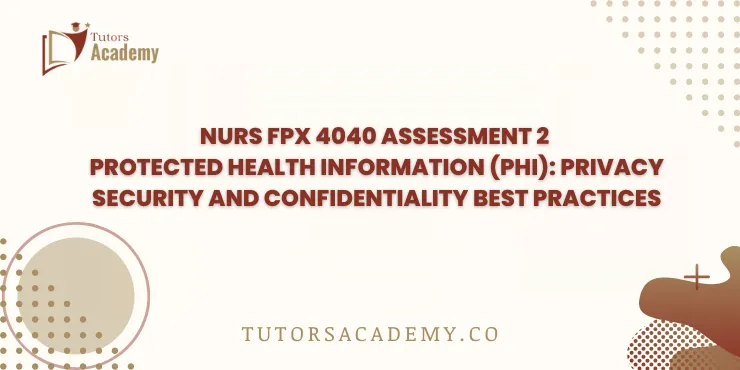
- NURS-FPX 4040 Assessment 2 Protected Health Information (PHI): Privacy, Security, and Confidentiality Best Practices.
Protected Health Information (PHI)
Student Name
Capella University
NURS-FPX 4040 Assessment 2 Protected Health Information (PHI): Privacy, Security, and Confidentiality Best Practices
Instructor Name
Due Date
Protected Health Information (PHI)
HIPAA is the most significant and indispensable policy in the US, providing specific guidelines to regulate nurses’ conduct related to patient safety, confidentiality, and the protection of sensitive information. HIPAA requires nurses to respect patients’ rights and treat them with dignity and respect, thereby enhancing the effectiveness of healthcare organizations. Failure to follow HIPAA guidelines can result in severe consequences, including fines and penalties, within the United States. It can also negatively impact the affected individual’s care outcomes (Lee, 2021).
Ultimately, with HIPAA guidelines, nurses can exercise greater control over their professional practices to prevent breaches of confidential information. HIPAA was significant in the 1990s because it enabled nurses to advocate for their patients’ rights and safeguard their records from misuse. Because HIPAA imposes civil penalties on those who fail to comply with its guidelines, it aims to protect all private information in the United States. Explore NURS FPX 4040 Assessment 3 Evidence-Based Proposal and Annotated Bibliography on Technology in Nursing for more information.
Importance of Interdisciplinary Collaboration for Protecting Sensitive Information
Nurses are responsible for focusing on interdisciplinary collaboration as a quintessential tool to protect patients’ sensitive information effectively. In hospitals, managers also require patients’ private information every time as a notable way to make informed treatment decisions. Effective collaboration and speaking their thoughts on time can help nurses incorporate patients’ personal health information (PHI) into their notes and defend patients’ personal health information preferences.
All American states benefit from HIPAA compliance guidelines because, in 1996, these recommendations needed to be strictly followed, using the standard techniques of nurses and experts.
This argument is also supported by Choi’s (2021) examination, which states that HHIPAA is tremendously helpful in protecting the safety, rights, and private information of patients in American healthcare organizations, allowing them to regain greater control over their lives. Consequently, nurses must find processes to mitigate dangers and avoid breaching HIPAA jail hints.
NURS FPX 4040 Assessment 2 Protected Health Information (PHI): Privacy, Security, and Confidentiality Best Practices
Because social media can harm patients’ leisure pursuits through privacy breaches and the posting of sensitive information on Twitter or Facebook by nurses, the test, using Vaishnav’s method (2021), explains how social media influences the violation of privacy felony guidelines in the US and why nurses are involved in such serious allegations.
For example, some nurses may post poor feedback about their patients and superiors on social media, harming their reputation. That is why HIPAA advises them to refrain from posting alternative care options or treatment choices for affected individuals on social media.
Approaches to Mitigate Risks to Protected Information
Due to sharing confidential data on social media, they regularly face the consequences of losing their jobs and incurring heavy fines. This is why evidence-based strategies must be developed to mitigate dangers and protect sufferers’ facts. For example, the risks of posting on social media must be mitigated by adopting possible IT measures that adhere to HIPAA guidelines and criminal recommendations to protect against the disclosure of patients’ information.
Furthermore, the consequences should be an obligatory part of businesses’ insurance to enhance information safety and confidentiality. This approach to mitigating risks will allow nurses to focus on adhering to IIP rules and criminal recommendations, rather than worrying about demotions or suspensions. Additionally, fact-generation on administrators and managers should suggest limiting access to public systems and ensuring that no unauthorized employees are granted access to these systems that contain sensitive personal data. This method involves retaining and updating stronger passwords and sending information through encrypted email to clients.
Staff Updates for Nurses to Ensure Information Safety and Security
- Healthcare managers should develop an evidence-based approach to prevent nurses and directors from posting or displaying sensitive patient care records through images and videos on social media platforms, company websites, and other online platforms (Vaishnav et al., 2021). Moreover, they should no longer be allowed to take operational snapshots of sufferers and post them on the internet. Mobile phones must be switched off during.
- Nurses can breach the facts, protection, and confidentiality rules of HIPPA except for difficulty; it is why, to implement those rules, managers need to make guidelines to stop them from illegal posting of pictures on social media through the use of incorporating fines as a fantastic deal as $two hundred,000 or ten years in prison.
- Our enterprise needs to implement and practice the use of more secure, numerous, and unique individual passwords on publicly accessible laptop systems that a nurse may access. This will help nurses protect sensitive personal information on computers by limiting access to a strong password…………………
References
HIPAA Overview & Compliance Guidelines. https://www.hhs.gov/hipaa/index.html
Protected Health Information (PHI) & Privacy Rules. https://www.cdc.gov/phlp/publications/topic/hipaa.html
HIPAA Violations & Penalties. https://www.hipaajournal.com/hipaa-violations/
Social Media & HIPAA Compliance for Nurses. https://www.nursingworld.org/practice-policy/nursing-excellence/official-position-statements/id/social-media/
